|
|
|
Sort Order |
|
|
|
Items / Page
|
|
|
|
|
|
|
| Srl | Item |
| 1 |
ID:
108058
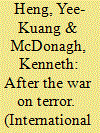

|
|
|
|
|
| Publication |
2011.
|
| Summary/Abstract |
In March 2009, the Obama administration sent a message to senior Pentagon staff instructing them to refrain from using either of the terms 'Long War' or 'Global War on Terror' and to replace these terms with 'Overseas Contingency Operations'. The change in tone and, potentially, substance, from the Obama White House by ending the 'war on terror' at the rhetorical level suggests a need to shift our academic attention towards developing more appropriate analytical frameworks for examining alternative strategies for countering terrorism. This paper seeks to explore what it terms an emerging risk-based approach being deployed by states. Our framework proposed here deploys the twin concepts of 'risk bureaucracies' and risk regulatory regimes (RRRs) in examining terrorist financing and aviation security regulations.
|
|
|
|
|
|
|
|
|
|
|
|
|
|
|
|
| 2 |
ID:
146994
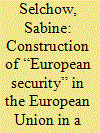

|
|
|
|
|
| Summary/Abstract |
In June 2015 High Representative Mogherini presented her strategic assessment The European Union in a changing global environment as the express point of reference for the new EU Global Strategy. Grounded in the premise that this assessment is not simply a description of the state of the world but plays into the construction of social reality, this article sets out to understand the openings and closings of possibilities that it holds. My analysis generates a number of concrete insights, ranging from insights into the distinct nature of the challenges the EU is facing, to the discovery that there is no “existential threat” and the importance of “regions” as a guiding category. Grounded in an understanding of the world as being reflexive modern, I interpret these findings as displaying an intriguing and paradoxical interpretive disposition. On the one side, there is a notable opening towards unconventional conceptions of the world; on the other side, there is a symbolic conservation of existing EU institutions and programmes and a reproduction of modern premises. I argue that it is the first aspect that makes the document significant: Mogherini’s strategic assessment opens an important discursive space to think (European) security anew.
|
|
|
|
|
|
|
|
|
|
|
|
|
|
|
|
| 3 |
ID:
134315


|
|
|
|
|
| Summary/Abstract |
The alleged death of British multiculturalism has been celebrated in some quarters and regretted in others. Invoking Ulrich Beck’s discussion of zombie categories, we argue that while the appeal of ‘multiculturalism’ as a term has clearly declined, the category in Britain that it refers to encompasses not a single charter, but a series of political settlements and public policies that remain in place even though they have been joined (and frequently challenged) by others. Distinguishing between the term and the category is a valuable means of assessing the persistence of multiculturalism as a mode of integration in Britain.
|
|
|
|
|
|
|
|
|
|
|
|
|
|
|
|
| 4 |
ID:
134334


|
|
|
|
|
| Summary/Abstract |
The alleged death of British multiculturalism has been celebrated in some quarters and regretted in others. Invoking Ulrich Beck’s discussion of zombie categories, we argue that while the appeal of ‘multiculturalism’ as a term has clearly declined, the category in Britain that it refers to encompasses not a single charter, but a series of political settlements and public policies that remain in place even though they have been joined (and frequently challenged) by others. Distinguishing between the term and the category is a valuable means of assessing the persistence of multiculturalism as a mode of integration in Britain.
|
|
|
|
|
|
|
|
|
|
|
|
|
|
|
|
| 5 |
ID:
145979
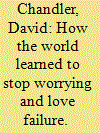

|
|
|
|
|
| Summary/Abstract |
In modernity, failure was the discourse of critique, today, it is increasingly the discourse of power: failure has changed its allegiances. Over the last two decades, failure has been enfolded into discourses of power, facilitating the development of new policy approaches. Foremost among governing approaches that seek to include and to govern through failure is that of resilience. This article seeks to reflect upon how the understanding of failure has become transformed in this process, particularly linking this transformation to the radical appreciation of contingency and of the limits to instrumental cause-and-effect approaches to rule. Whereas modernity was shaped by a contestation over failure as an epistemological boundary, under conditions of contingency and complexity there appears to be a new consensus on failure as an ontological necessity. This problematic ‘ontological turn’ is illustrated using examples of changing approaches to risks, especially anthropogenic understandings of environmental threats, formerly seen as ‘natural’.
|
|
|
|
|
|
|
|
|
|
|
|
|
|
|
|
| 6 |
ID:
080901
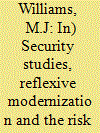

|
|
|
|
|
| Publication |
2008.
|
| Summary/Abstract |
At the dawn of the twenty-first century, the overwhelming challenge that confronts Western policy-makers is the management of diverse, amorphous and qualitative security risks, rather than the fixed, quantifiable threats of yesteryear. As such, policy-makers have had to move from a reactive to a more proactive mindset, which ultimately challenges established international institutions and norms of action. This change has been seen at both the domestic and international levels and gained prominence with sociologist Ulrich Beck's Risk Society thesis in the early 1990s. The risk paradigm calls into question many commonly used concepts in international relations (IR), such as established forms of cooperation and the utility of force. Because such a burgeoning security studies research agenda, inspired by Beck's writing, has begun to develop, I examine this new literature and the challenges that the Risk Society paradigm poses to IR as an academic study. I also raise the need to reconsider thinking surrounding the use of force, security cooperation and international law in light of the security risks and challenges that confront the West today.
|
|
|
|
|
|
|
|
|
|
|
|
|
|
|
|
| 7 |
ID:
124595
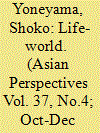

|
|
|
|
|
| Publication |
2013.
|
| Summary/Abstract |
The human and ecological disasters of Minamata and Fukushima highlight Japan's need to plan for a sustainable future. Ogata Masato, a Minamata fisherman, through his philosophy of "life-world" suggests that this quest for a sustainable future requires a change in the epistemology of social science. His philosophy offers a postmodern version of Japan's heritage of animism, where humans are connected with all living beings, including the souls of the living and the dead, as well as animate and inanimate entities in nature. His philosophy thus presents an alternative framework for a new modernity.
|
|
|
|
|
|
|
|
|
|
|
|
|
|
|
|
| 8 |
ID:
148326
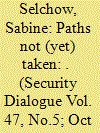

|
|
|
|
|
| Summary/Abstract |
While it is Ulrich Beck’s concept of ‘risk society’ that has mostly attracted attention in the field of security studies, in this article I argue that if we want to take Beck seriously, we need to go beyond his ‘risk society’ thesis and acknowledge that his main thesis was that we live in a social reality that is qualitatively new and, consequently, calls for a radical shift in how we look at and talk about it. To bring Beck into security studies, then, means to study ‘security’ from within Beck’s ‘new world’. For that, I argue, a sharper conception of what characterizes that world is needed. At the heart of my article I provide such a conception – the ‘cosmopolitized world’ – which I identify as being shaped by non-linearity and the interplay of two moments: the ‘cosmopolitized reality’ and the ‘tradition of the national perspective’. Building on this concept and experimenting with it, I turn to reading the ‘US national security’ discourse as this is constructed in the text of the 2015 National Security Strategy from within this ‘cosmopolitized world’. Reflecting on this experiment, I conclude by highlighting the potential that bringing Beck in this way into security studies holds, as well as pointing to the need for future work on the vocabulary of the ‘cosmopolitized world’.
|
|
|
|
|
|
|
|
|
|
|
|
|
|
|
|
|
|
|
|
|